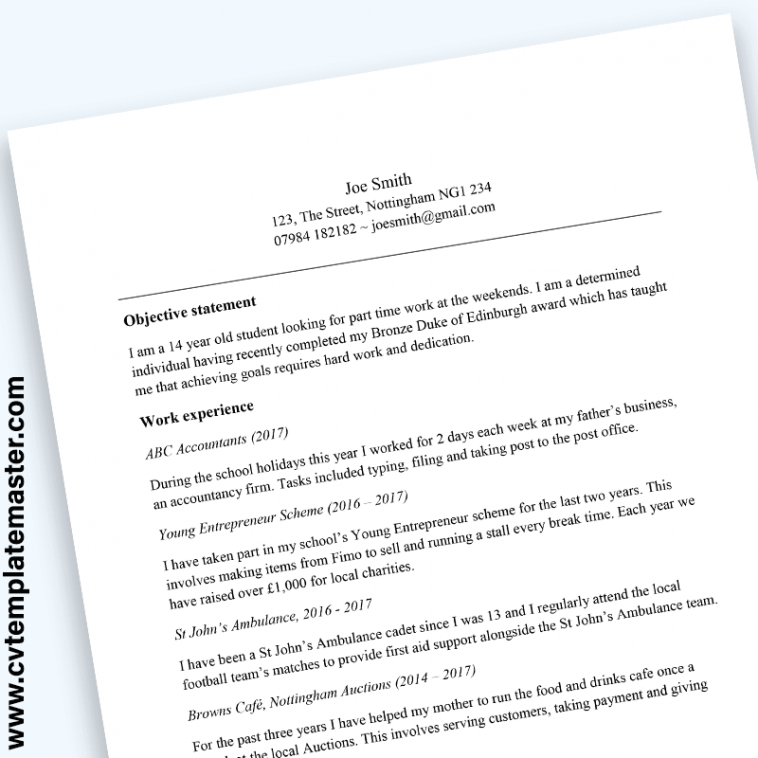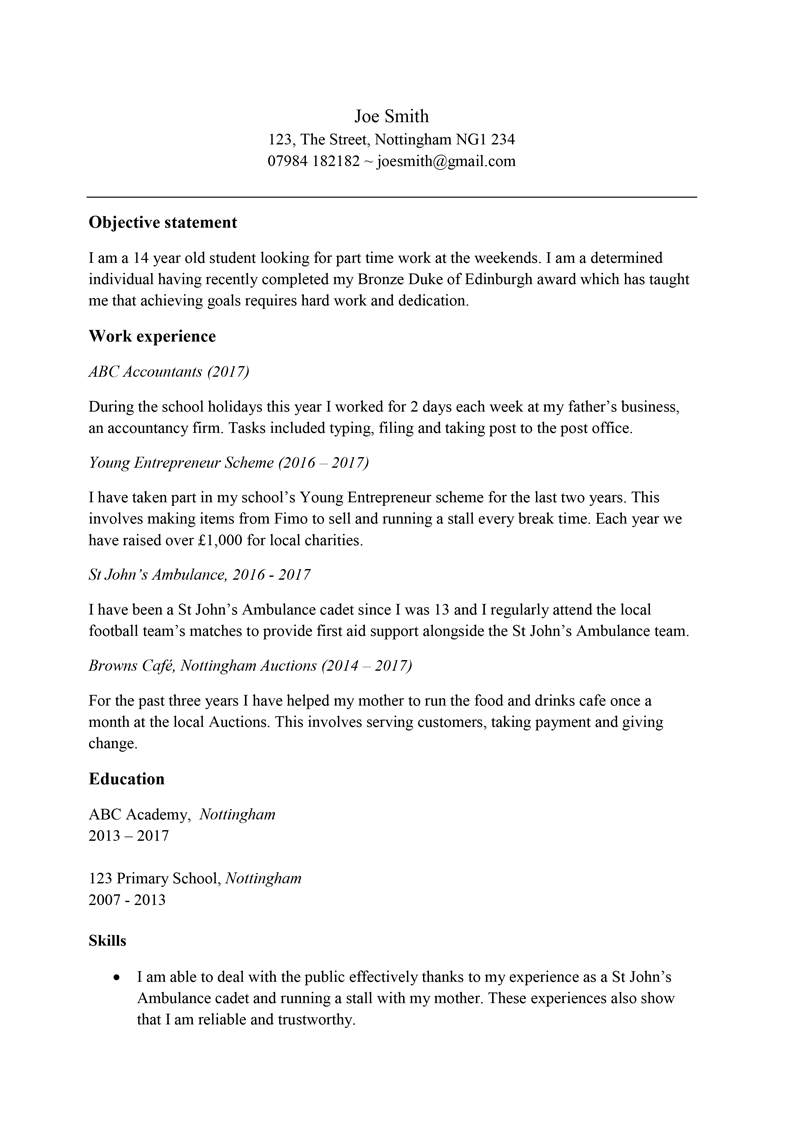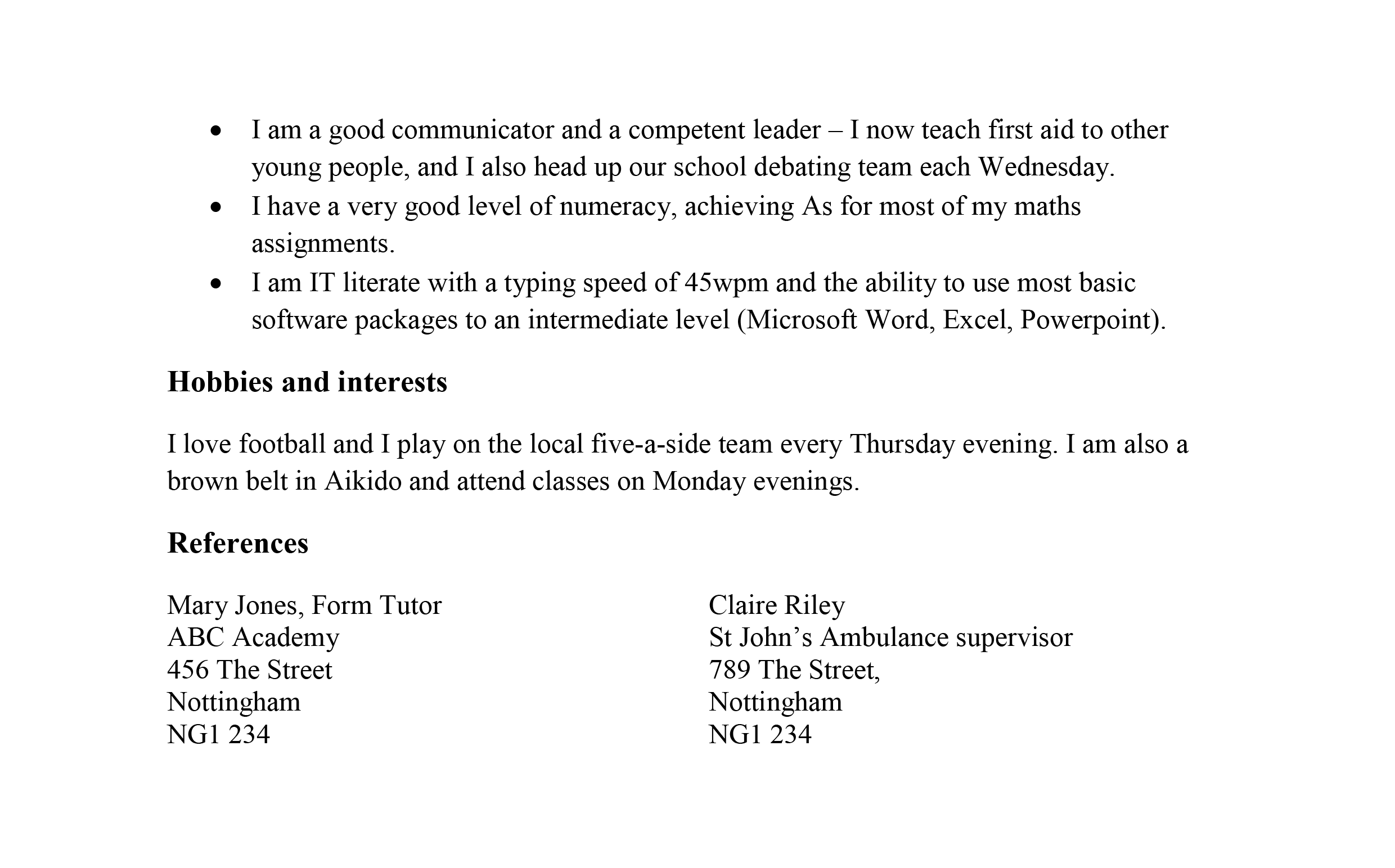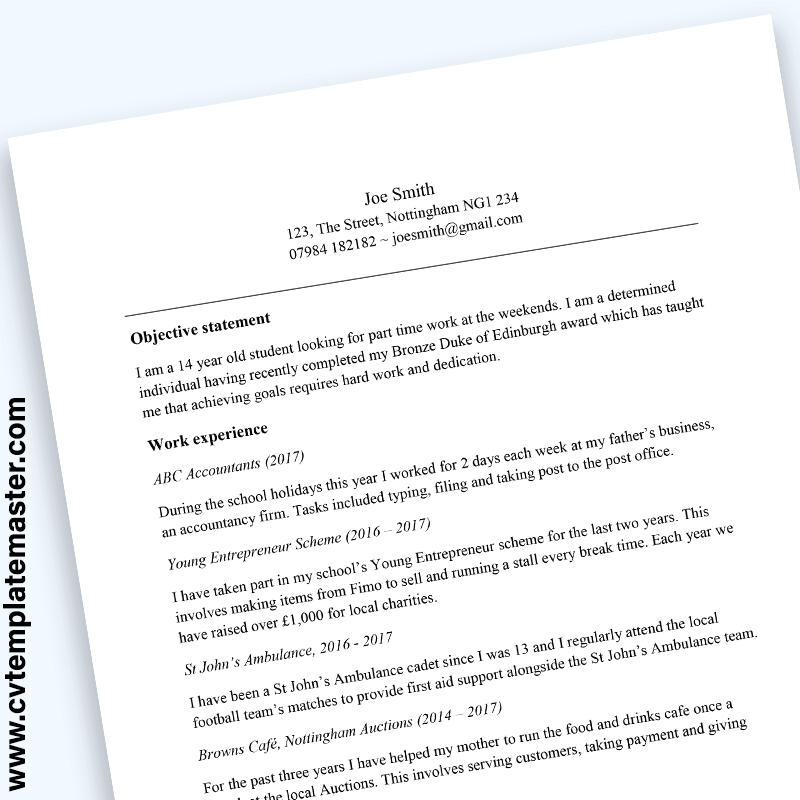Text preview of this CV template:
This is a text-only preview - download the formatted Word file using the link above.
Joe Smith
123, The Street, Nottingham NG1 234
07984 182182 ~ joesmith@gmail.com
Objective statement
I am a 14 year old student looking for part time work at the weekends. I am a determined individual having recently completed my Bronze Duke of Edinburgh award which has taught me that achieving goals requires hard work and dedication.
Work experience
NB: These are just examples to help you use non-conventional experience on your CV. Don’t worry if you don’t have quite as much to include!
ABC Accountants (2017)
During the school holidays this year I worked for 2 days each week at my father’s business, an accountancy firm. Tasks included typing, filing and taking post to the post office.
Young Entrepreneur Scheme (2016 – 2017)
I have taken part in my school’s Young Entrepreneur scheme for the last two years. This involves making items from Fimo to sell and running a stall every break time. Each year we have raised over £1,000 for local charities.
St John’s Ambulance, 2016 – 2017
I have been a St John’s Ambulance cadet since I was 13 and I regularly attend the local football team’s matches to provide first aid support alongside the St John’s Ambulance team.
Browns Café, Nottingham Auctions (2014 – 2017)
For the past three years I have helped my mother to run the food and drinks cafe once a month at the local Auctions. This involves serving customers, taking payment and giving change.
Education
ABC Academy, Nottingham
2013 – 2017
NB: If you do actually have your GCSE grades back, include them here. Alternatively you might include a predicted grade, as long as you make it clear that it is predicted and not final.
123 Primary School, Nottingham
2007 – 2013
Skills
- I am able to deal with the public effectively thanks to my experience as a St John’s Ambulance cadet and running a stall with my mother. These experiences also show that I am reliable and trustworthy.
- I am a good communicator and a competent leader – I now teach first aid to other young people, and I also head up our school debating team each Wednesday.
- I have a very good level of numeracy, achieving As for most of my maths assignments.
- I am IT literate with a typing speed of 45wpm and the ability to use most basic software packages to an intermediate level (Microsoft Word, Excel, Powerpoint).
Hobbies and interests
I love football and I play on the local five-a-side team every Thursday evening. I am also a brown belt in Aikido and attend classes on Monday evenings.
References
| Mary Jones, Form Tutor ABC Academy 456 The Street Nottingham | Claire Riley St John’s Ambulance supervisor 789 The Street, Nottingham NG1 234 |
Template details:

Here’s a full preview of page one of this CV for teenager job applicants:

And here’s page two:

How to write a CV for teenager job applicants
This guide will help you create a CV for teenager-suited roles.
Whatever role you’re hoping to land, you’ll likely be asked to submit a curriculum vitae (CV) when applying. For teenagers, if you have work experience, your CV layout should be:
- Personal details
- Personal statement
- Work experience
- Education
- Skills
- Hobbies & interests
- References
If you DON’T have work experience, the ‘Skills’ section replaces this section so the layout is as follows:
- Personal details
- Personal statement
- Skills
- Education
- Hobbies & interests
- References
We’ll explain what goes into each of those sections below:
Personal details
If you apply for a part time job, prospective employers need to know how to contact you. At the top of your CV, you need to include:
- Name
- Address
- Email address – try to use one that looks reasonably professional. If your email is jolovesfootie@hotmail.com, you could get a new one for job applications (e.g. joebloggs@hotmail.com)
- Phone number
- Age – ordinarily it wouldn’t be necessary to include your age. However, if you’re under 16, it’s important that you tell prospective employers so they can make sure the job is suitable for you. They may also need to check that you are covered by their insurance.
DON’T specify personal data such as: your religion, your nationality or ethnic origin, or your gender. These are not relevant and may lead to discrimination.
Personal statement
This is a brief section (approx. 3 lines) that tells the hiring manager who you are, what you have to offer, and what you are looking for. Here are some examples:
“I am a 13 year old student looking for a part time job on Saturdays. I am friendly, reliable and hard working, and I give my very best in everything I do. I have a keen interest in Maths and Physics, and I achieve exceptional grades for all my assignments. I have also achieved a brown belt in Aikido and a Black Belt in Tae Kwan Do.”
“I am a 14 year old student looking for part time work after school and/or at the weekends. I am a determined individual having recently completed my Bronze Duke of Edinburgh award which taught me that achieving goals requires hard work and dedication.”
“I am a 15 year old hard-working student looking for part time weekend work. I am a very focused individual who works hard and puts a lot of effort into everything I do, as evidenced by my predicted GCSE grades: currently 4 As, 4Bs and a C.”
It’s really important to think about what the employer is looking for and to tailor every CV you send out to the specific job. The personal statement is a great place to tell potential employers in a few lines how you meet the requirements of the job advert. An effective personal statement highlights your skills in relation to a particular job post.
Work experience
If by chance you have completed any work (including volunteering), you should have a section in your CV entitled ‘Work Experience’. For formal work experience, you need to include:
- Job title
- Place that you worked
- Dates that you worked there
You then give a short description of your role. For example:
“I volunteered on Saturday mornings at Oxfam which included: working on the till, sorting through stock, putting new stock out, tidying displays.”
If you did more casual / non traditional types of work experience such as babysitting, you don’t need to present this type of experience in a formal way. See our example CV for ideas of what you could write.
When thinking about whether you have any work experience, consider:
- Have you done any voluntary work?
- Do you have your own website?
- Do you regularly bake for a local cause?
- Do you make something to sell?
- Do you help with sports coaching?
- Do you babysit?
- Do you walk anyone’s cats or dogs for money (your own don’t count!)?
- Do you help care for an older person?
- Have you made money washing cars or mowing people’s lawns?
Most people of your age won’t have work experience, so don’t worry if you have nothing to put here – simply leave this section out.
Skills
There are two types of skills : hard skills and soft skills.
Hard skills
Hard skills are very definable and measurable – such as typing at a certain speed, or the ability to use a certain software package (e.g. Microsoft Word). You can easily test whether someone does or does not have a particular hard skill.
If you can type quite well and it is relevant to the job, take an online typing test to find out your speed. Typing speed is written as ‘WPM’ – words per minute. A speed of 35 – 40 wpm with reasonable accuracy is generally acceptable; while 55 wpm is highly desirable for jobs where typing is central to the role.
IT literacy is relevant to many jobs – even working in a shop. You usually state if you can use Software packages such as Word along with an indication of how accomplished a user you are (basic, intermediate, advanced).
Soft skills
Soft skills are less definable and measurable – they include skills such as good communication or the ability to work well in a group.
 For each role you apply for, think carefully about what each employer is looking for, in terms of soft skills and hard skills. Sometimes this will be stated in the job application – other times you will have to think about what the role requires.
For each role you apply for, think carefully about what each employer is looking for, in terms of soft skills and hard skills. Sometimes this will be stated in the job application – other times you will have to think about what the role requires.
If you’re applying to work in a shop or cafe for example, these skills are important to your employer:
- Good customer service – friendly, likeable, going out of the way to help people
- Good communicator – so you can help people who have questions
- Attention to detail – so you can spot when things aren’t right
- Numeracy – as you’ll be handling both money and goods
- Reliability – they want to know you’ll show up for your shifts
- Trustworthiness – as again you’ll be handling both money and goods
- IT literacy – to use any in-store systems
Most of the above skills are SOFT skills with the exception of numeracy which is a HARD skill.
It’s very easy to say you have a certain soft skill – as many people do on their CV – but it’s far more powerful if you can offer proof that you have that skill. You might not be able to offer evidence of everything the employer wants/needs but you should try and cover as many as you can, keeping things brief and to the point. Here is an example of how you could match the above list of skills to evidence that you have a particular skill:
- I am able to deal with the public effectively – I have been a St John’s Ambulance cadet since I was 10 and regularly volunteer providing first aid cover at local football matches.
- I am a good communicator and a competent leader – I now teach first aid to other young people, and I also head up our school debating team each Wednesday.
- I am reliable and trustworthy – I regularly help my Mum when she runs stalls at the local Church to raise funds, serving customers who make purchases.
- I have a very good level of numeracy – I achieve As for most of my maths assignments.
- I am IT literate – I have a typing speed of 45wpm and the ability to use most basic software packages to an intermediate level (Microsoft Word, Excel, Powerpoint).
You can see how much more convincing the above list is than if you simply write ‘Good communicator’ or ‘trustworthy’ in a list.
Education
- You need to provide a list of your schools and the dates you attended. It is not absolutely necessary to include primary schools.
- If you are in year 10 or 11 (or you have started your GCSEs in year 9) it is advisable to give predicted grades, or actual grades if you have taken any exams early.
Hobbies & Interests
- This section is often overlooked (even by adults) but it’s a great opportunity to tell the employer about positive hobbies you have which reflect well on you as a person.
- Fitness, sports and other active hobbies tend to be favoured by employers. They show you are active and healthy.
- Anything that shows an interest in culture or the local community will also look favourable (for example, involvement in a Drama or theatre group).
- Leave off anything which isn’t really of interest to an employer such as your favourite music or the fact you like ‘films’ ‘going to the cinema’ or ‘seeing friends’.
References
If you are at school, you should give a teacher or tutor as one of your references.
The other reference should be someone who knows you, but not a family member or school friend. A person of professional standing such as someone who runs an activity that you attend would be a good choice.
We hope you’ve found our example CV for teenager job applicants and accompanying guide helpful. Ready to write your own CV? Download a completed CV template above – we’ve included examples of what to put in each section.
You may also find the following CV examples, templates and guides helpful:
Here are some other helpful templates and examples when writing a CV for a work experience placement:
- All student CV templates and guide
- Full guide on writing a CV with little or no experience (lots of examples)
- Apprenticeship CV example
- Example of a CV for a student in university
- School leaver CV template
- Alternative student CV template
- Work experience CV
- Skills based CV
- CV for a part time job (skills based)
Q: Can I get a part time job?
This section explains what the law says about teenagers working and how many hours a teenager can work.
Children aged 13 or older can get a part time job in the UK (the only exception for younger children is for those working in television, theatre or modelling – although a performance licence will be required).
You can’t work full time until you reach minimum school leaving age, at which point you can work up to 40 hours a week. The minimum school leaving age depends on which area of the UK that you live in – click here for more info.
If you’re under 16:
- Unfortunately you won’t be entitled to National Minimum Wage. When you reach 16 you’ll then be entitled to at least £4.55 per hour.
- You won’t pay National Insurance so your employer does not need to pay you through their PAYE scheme, unless your income exceeds your Personal Allowance
In addition there are quite a lot of rules to be aware of if you are under 16:
- You cannot work during school hours
- You cannot work before 7am or after 7pm
- You are not allowed to work for more than one hour before school (unless local bylaws permit it)
- You cannot work for more than 4 hours without taking a minimum 1 hour break
- As you might expect, you cannot work in pubs, betting shops and any other places specified by local bylaws
- You cannot do work that may be harmful to your health, well-being or education
- During term time you can only work a maximum of 12 hours a week, including
- A maximum of 2 hours on school days and Sundays
- A maximum of 5 hours on Saturdays if you are aged 13 to 14, or 8 hours if you are aged 15 to 16.
- If you are aged 13-14, during school holidays you can only work for a maximum of 25 hours each week, including:
- a maximum of 5 hours on weekdays and Saturdays
- a maximum of 2 hours on Sunday
- If you are aged 15-16, during school holidays you can only work for a maximum of 35 hours a week, including:
- a maximum of 8 hours on weekdays and Saturdays
- a maximum of 2 hours on Sunday
- You must have a 2 week break from work during the school holidays every year
- A permit to work may be required by local bylaws – check with your local council
Local bylaws list the jobs that children can’t do. If a job is on this list, a child under the minimum school leaving age can’t do this work.
To check if there are any relevant local bylaws that apply, contact your Local Council’s education or education welfare department.
Originally published 22nd December 2017.
